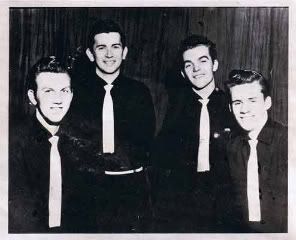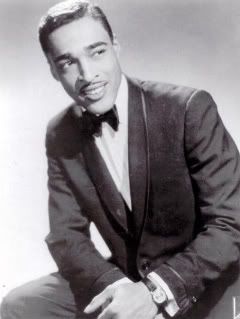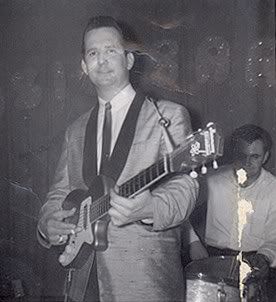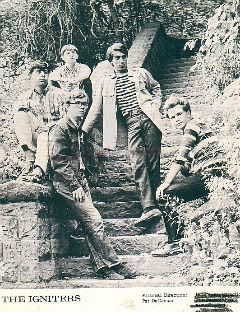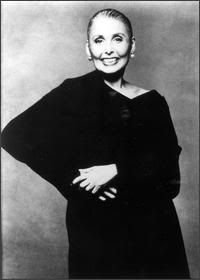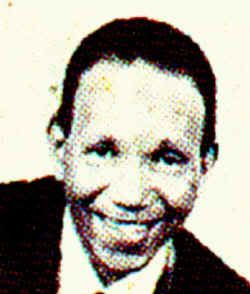
Chuck Edwards from PennSOULvania
Soul shouter and early local guitar hero Chuck Edwards was born Charles Edward Edwins in Pittsburgh (although there is some debate about whether he was born here or in Philly) on November 29, 1927.
He started playing guitar professionally in the late 40’s, eventually heading south and joining up with the popular Sonny Thompson Band. He cut his first piece of wax with them on the be-bop "Harlem Rug Cutter" around 1950.
Edwards struck out on his own, recording for Memphis' Duke Records, home of Bobby "Blue" Bland. As Charles Edwins, he released "Bong Gone" b/w "I Got Loose" (Duke 124) in 1954.
Dumping his given last name in favor of Chuck Edwards, he produced three more singles for Duke. The records were "If You Love Me (Like You Say You Do)" b/w "You Move Me" (Duke 159) in 1956, and and another pair in 1957, "Let's Rock" b/w "I'm Wondering" (Duke 163), followed by "Morning Train" b/w "Warm My Heart" (Duke 174).
Though none of them exactly flew off the shelves, they showed Edwards steady progression from a blues player to a rowdier R&B artist, where he would find his niche.
He switched labels to Apollo in late 1956, and released the doo-wop ballad "Just for a Day" b/w "She Carried Me All Over Town" (Apollo 495), and disappeared for a couple of years.
In 1959, Edwards cut the Alanna single "If I Were King " b/w "Lucy and Jimmy Got Married" (Alanna 577), backed on the latter by the Five Crowns, allegedly featuring budding soul master Ben E. King. The B side, as was commonplace back in the day, was the side the DJs decided to spill some radio love on, but it didn't chart.
Possessed of several dust-collecting disks and a better half, he moved back to the Steel City 'burb of Canonsburg, working a day job in a steel mill to pay the bills. Being a fair-sized fish in a small pond, he picked up a lot of local session work and was a regular on the hops circuit.
Edwards may not have slept much, but he saved up enough money to front his own label, Rene, named for his wife, Irene. He recorded a couple of other artists, but by and large, the Hill District label and its subsidiary, Punch, were Edwards' domain. Here's his personal discography on the Rene/Punch label:
Rene 1151 - Phil Lipari and the Chuck Edwards Band (1962)
"Please Come Back" b/w "Later for You Darling"
Rene 1152 - Chuck Edwards (?)
"Shake Baby Shake" b/w "Come On Babe"
Rene 5050- Chuck Edwards (1965)
"I Don’t Want No Company" b/w "Do Right Baby"
Rene 7001 - Chuck Edwards (1966)
"Bullfight" b/w "Chuck Roast"
Rene 20013 Chuck Edwards (1966)
"Bullfight #2" b/w "Pick It Up Baby (Your Love’s Slowing Down)"
Punch 11001 Chuck Edwards (1968)
"Downtown Soulville" b/w "I Need You"
He also had one other release during that span, for the national Kapp Records. It was 1967's "Sweet Sweet Love" b/w "You Got What I Need" (Kapp 2052). Like the rest of his major label vinyl, it went nowhere on the charts.
"Shake Baby Shake" and "I Don't Want No Company" were garage-style rockers, featuring Edwards' raucous vocals, and were popular at the dances in the region. But his claim to Tri-State fame was the instrumental "Bullfight."
"Bullfight" was a show-stopper for Edwards' live act for years, but was never etched in wax. The story goes that Travis Klein, of Itzy Record fame, prodded Edwards to record it. Klein booked some time at the old Gateway Studios for Edwards, who released the song on his own Rene label. The rest is Pittsburgh rock history.
The song became a monster regional hit, and was picked up for national distribution by Roulette (R-4705). It remains a Pittsburgh oldies radio fav to this day. In fact, George Benson was a fan, and he recorded it himself on his 2001 "It's Uptown" album.
"Bullfight No. 2," issued later in the year, added a Hammond organ to the original guitar, bass, and drum tune. Hey, gotta strike while the iron's hot, right?
While "Bullfight" cemented Edwards' name in Pittsburgh circles, his last local release, 1968's "Downtown Soulville," put him on the international map. The soul/funk title tune, backed with the ballad "I Need You," became a Northern Soul must-have across the pond.
The record never charted nationally, but UK soul impressario Dave Godin reissued it on his own Soul City label (SC 104) the following year, and included it on the compilation LP, "Soul From The City."
Edwards dropped from the radar recording-wise for a spell afterward, performing live. In 1972 he packed up his family - he had two sons, Les and Jeff - and moved to the San Francisco Bay area, living in a motel for several months. It was there that the Edwards family became the band The Edwards Generation.
They released a 45, "School Is In" b/w "Someone Like You" on Ghetto records (61?), and a LP in 1976, "The Street Thang" on Tight records. The group also appeared on television a few times, including the Mike Douglas Show.
Edwards performed locally, and released "Back Again" (Tight) in 1994, which has a mix of new and past material. His sons went on to form their own band, Movin’, and perform in the Bay Area.
Edwards and his wife retired to the San Jose suburb of Pittsburg, California, where he passed away in 2001.
Some of Edwards’ cuts are still available on compilations. "Bullfight" is on Itzy Records PGH I and Crypt Records "Pass The Soul." PGH IX features "She Carried Me All Over Town."
There is also the split-side CD "Billy Lamont Meets Chuck Edwards" (Official 5678) which features 13 of Edwards' early sides, including recordings from the Duke, Apollo and Alanna labels, some backed by Little Richard's band.
And his records go for a king's ransom overseas. Chuck Edwards may be gone, but his music rocks on across the continents.
Chuck Edwards - "Bullfight"
